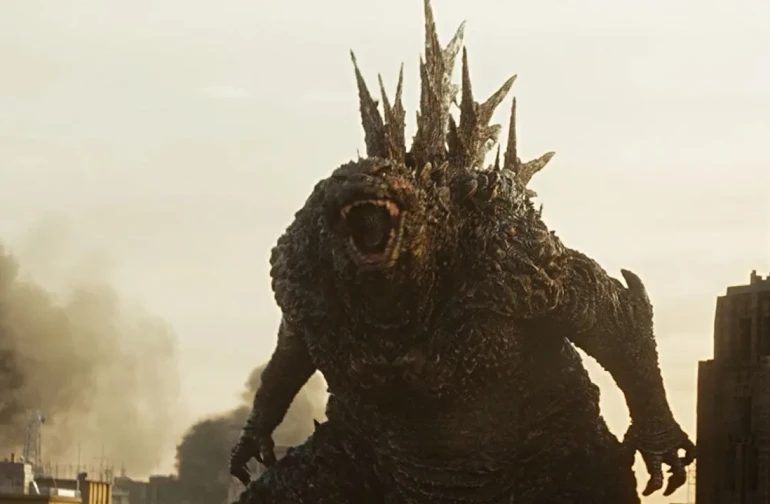Godzilla has taken many depictions in the God Zilla cinematic Universe, maturing from a baby kaiju to a Westernized egg-laying entity and a metamorphic sea creature. Even with these metamorphoses, its core metaphorical significance remains the same, which acts as a medium to plunge into the “ shadow side” of humanity. The most recent work by Takashi Yamazaki, “Godzilla Minus One,” revisits the titan’s beginnings in Japan in the years following World War II.
Jump into a time machine and rewind to 1945. The stage sets to the ghostly repercussions of the nuclear bombings of Hiroshima and Nagasaki. Kamikaze Pilot Kōichi Shikishima (Ryunosuke Kamiki) chooses self-perseverance over being a noble martyr, who denounces him as a coward in the eyes of his fellow soldiers. As Godzilla ravages Odo Island, only Kōichi and former Navy member Sōsaku Tachibana (Munetaka Aoki) survive, laying the foundation for a narrative encompassing resilience, guilt, and the emergence of a colossal, atomic-breathing menace.
Read More Articles:
Most Awaited Movies of 2024 That Can’t Be Missed
Disney’s Upcoming Movie Releases & From 2023 To 2027
New Netflix Shows to Look Forward to in 2024
Top 6 TV Shows to Binge Watch Before 2023 Ends
The movie captures the essence of a country trying to recover from the ramifications of war and uncover the impact a government’s decision has on its nation. Kōichi’s internal struggle indicates the bitterness people feel when they have no choice but to fight a war they did not consent to. It also emphasizes the role that collective resilience plays in mending broken lives. We meet characters like the captain Yōji Akitsu (Kuranosuke Sasaki) and engineer Kenji Noda (Hidetaka Yoshioka), showcasing strength in hard times and not relying on military or political power. Yamazaki’s portrayal of Godzilla in “Minus One” seamlessly melds modern filmmaking sensibilities with the classic Toho style. The creature is depicted with aquatic grace and unimaginable strength, particularly in high-seas sequences where numerous sailors meet their demise.
The fully evolved Godzilla’s landfall paints a vivid picture of a colossal and visceral force, triggering post-traumatic stress disorder reminiscent of the aftermath of war. The film skillfully amalgamates digital, practical, and occasionally whimsical effects to craft a captivating spectacle, paying homage to Toho’s timeless approach. God Zilla Minus came out on the same day as the franchise’s 70th birthday. Modern filmmakers’ increased ability to produce breathtaking sequences of massive destruction has made Godzilla movies’ portrayals of the current day intriguing in recent years. However, writer/director Takashi Yamazaki’s Godzilla Minus One goes back to the titan’s beginnings to deliver a tragic narrative that exposes the genius of the original concept.
Godzilla Minus One is a pivotal piece within the Toho canon, offering a poignant exploration of Japan’s post-war struggles through the colossal, atomic-breathing monster. As Godzilla continues to evolve as a tangible creature and a symbolic representation of human complexities, the franchise maintains its enduring appeal, transcending generations and remaining a potent medium for storytelling.







